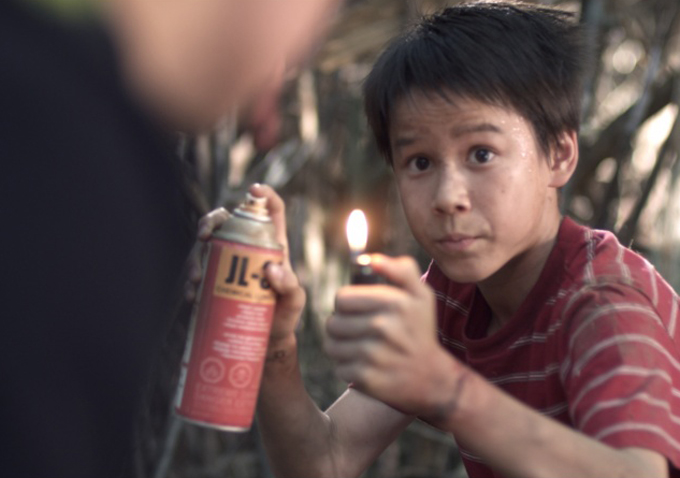
If you have a point to make,
try not to make it too succinctly in the first five minutes of your film. Such
is the ace in the hole that is “I Declare War,” a crude sketch of a film that
could barely withstand a short-form, but instead has been stretched to agonizing
feature length by directors Robert Wilson and Jason Lapeyre. The joke (is it a
joke?) is that children organize a game of Capture The Flag, or War, or
whatever they are calling it, and there’s very little difference between these
kids playing an imaginary game, but also adults on separate sides of a
conflict. There’s also the suggestion that much of this conflict is based on
what the kids have seen in war video games and movies (kids name-dropping “Call
Of Duty” makes more sense than “Patton”), but, y’know, lip service.

The idea does gather a bit of
traction due to the performances by a naturalistic young cast. As these
youngsters skulk about in the woods, plotting strategy with makeshift weapons,
their interplay offers the sort of charm absent in more tense moments, when
these kids inorganically curse like social malcontents. Earlier generations may
have prided themselves on arbitrary rules that adults would not play by: now,
the film argues, the cues have been taken by world leaders who welsh on promises
and the candid media coverage of the more questionable actions taken by
misguided soldiers. Breaking all the rules may render the game irrelevant. But
bending a few of them tests allegiances and fortifies bonds. Or maybe it’s just
fun to make your peers flinch.
The chief gimmick of the
picture is that while they fight with water balloons, sticks and rocks, we see
it in their imagination, where weapons cause bloodshed, and toys land like
grenades, bullet casings littering the ground. It’s interesting when the
illusion wavers, and we’re uncertain if a child is actually using a real knife
or a play one. Other moments are decent gags, like the kid who grabs a stick
and suggests it would make a great rocket launcher, only to be toting around an
actual launcher later in the picture without explanation. Unfortunately, the
film is constantly cutting away to deflate its own taboo of kids with guns,
peeling back the sadistic veneer to remind us these are just kids with twigs
and gizmos. Had the film insisted on keeping these kids armed to the teeth in a
world without adults, the satirical elements would mean much more.

Making a film like this, which
is 95% conceptual, you tend to lose sight of the fact that all the ideas in the
world can’t substitute for what’s being put up onscreen. And “I Declare War,”
which never departs from what seems like a half-square mile in the woods, isn’t
able to transcend the visual repetitiveness of its location. The cast seem
mired in the same shot-reverse shot action moments, and there’s no attempt to
either mimic the vocabulary of action films, or take a more whimsical,
heightened approach to suggest a more fantastical children’s impression of what
a shootout would look like. Basically, the approach to the violence is just to point
and shoot: Wilson and Lapeyre will likely receive various other offers to
direct in the future, but chances are none of them will be action films.
Compare this to the similar go-for-broke style of “Son Of Rambow,” and you’ll
see the diminished craft failing to capture the sensibilities of hormonal
youths raging against the elements.
Furthermore, the base elements
of what the viewer is left with is the idea of cruel children expressing their
hostilities against each other, apple-cheeked preteens slinging curse-word
insults at each other. Taken by themselves, foul words have the ability to
shock and disorient, sometimes for laughs: there used to be a transgressive
thrill that came from putting them in the mouths of kids. But unless later
generations have become desensitized, foul language remains harsh on the ears,
and it’s even rougher coming from the mouth of a kid. This isn’t an issue of
morals, but headaches: hearing brats scream all day is a special kind of hell.
Hearing them use these sorts of words is not pleasurable by any means. Young
Mackenzie Munro plays the game’s only girl, and not coincidentally, the only
non-screaming miscreant. Seeing her arc, where she learns to employ her young
sexual wiles to coax men into doing her bidding without making a promise or
exposing any skin at all, is a funny bit, one that finds a fresh way for a
character to explore her burgeoning sexuality in a coming-of-age narrative.
Perhaps in the sequel she can realize she doesn’t need to hang around these
boys one second longer. [C-]

